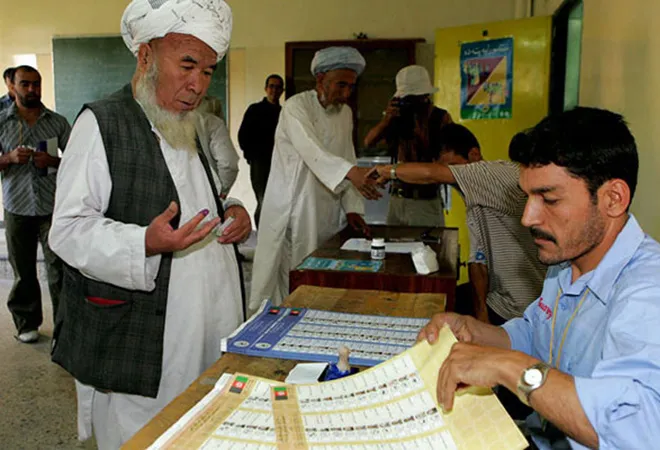-
CENTRES
Progammes & Centres
Location

“The Afghan elections are the success of its forces, people and the government”, president of Afghanistan Ashraf Ghani said a few hours before the country went to polls, and an hour before the killing of Gen Raziq.
This incident, in all its violence, showcases the tipping point at which Afghanistan peace is precariously balanced today.
Despite the ravages of war, advances of the Taliban and a depleting general security situation in the country, Ghani’s presidency has some light to show for, with these elections, the first such since 2002, the steady movements to strengthen democracy is good news for both the US and Kabul’s regional allies, particularly New Delhi. However, arguably the challenges for Afghanistan’s politics today far outpace the strides Kabul has made to strengthen democratic processes. The Afghan war, now 17 years old, is heading nowhere, is rudderless, and by all indications, endless.
A general distrust of political organisations is also prevalent, with more than 60% of those surveyed by AISS going for educated, independent candidates than political parties.
This situation has become a point of contention, debate and disruption in Washington DC with varying opinions on what future course American policy should take to end a 17-year-old conflict, which has cost more than 2,500 American lives and the American taxpayer upwards of $1 trillion. While many within the US establishment realise the catastrophes that await the international security apparatus in case of a sudden, unplanned and hurried exit from the conflict, the urgency to find an ‘out’ strategy across the board is palpable. This, despite a renewed air campaign in Afghanistan over the past few months to counter the new threat posed by ISKP, a group manned by former Tehrik-i-Taliban Pakistan fighters and smaller Pahstun warlords, with reports of Pakistani intelligence also playing a role within its ranks. Washington is now also coming to terms on the other alternatives when it comes to deciding on the future of Afghanistan, and there are enough hints that at least the administration of president Donald Trump is open to the idea of the Taliban’s political in the processes of Afghan democracy. This has led to the US being open to talks on Afghanistan led by Russia, which include regional heavyweights such as China, India and Pakistan.
While Afghan capacity to take on threats to its sovereignty militarily has increased steadily, it is not even close to attaining the capabilities needed to handle the challenges posed by the Taliban and others, such as ISIS Khorasan Province (ISKP) alone.
With corruption having been rampant in the run-up to these polls, Pakistan would have in all likeliness played its cards to make sure none of its interests, which include the Taliban itself – a group mothered by both Pakistan and the US to fight erstwhile Soviet Union in the 1990s. Pakistan’s army headquarters-cum-de-facto-capital Rawalpindi would have taken this opportunity to try and cement its hyper-local influence to both counter India, which has more pull in Kabul, and the US, which needs Pakistan to aid its 18th year of war. Amidst this smorgasbord of diplomatic maneuvering, New Delhi finds itself in its own predicaments – whether to support multilateral talks with the Afghanistan and go against its policy of not negotiating with terrorist groups, or face potential exclusion from a finale political process. Nonetheless, these polls and continuous work towards the democratisation of a country plagued by wars for much of its modern history should be seen as a beacon of hope, despite the security situation in Afghanistan raising more questions than answers every passing day.
Amidst the Afghan elections and the nurturing of its democracy, states such as Pakistan play a role that runs counter to ensuring stability.
The views expressed above belong to the author(s). ORF research and analyses now available on Telegram! Click here to access our curated content — blogs, longforms and interviews.

Kabir Taneja is a Deputy Director and Fellow, Middle East, with the Strategic Studies programme. His research focuses on India’s relations with the Middle East ...
Read More +
Jonathan Phillips James E. Rogers Energy Access Project Duke University
Read More +